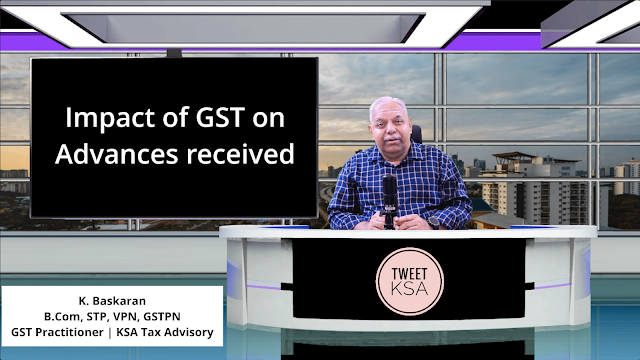Impact of GST on Advances received
While finalizing the books of accounts, the auditor should review the impact of GST liability on advances received and whether the said liability has been discharged as per the provisions of the GST Act.
Generally, advances can be classified as set out below:
(a) Security Deposits: These are utilised by the supplier only on occurrence of a contingent event. In case such even does not occur, then the security deposit will be refundable to the customer on completion or according to the terms and conditions of contract agreement. Generally, such deposits are not taxed under GST. However, in case of happening of the contingent event and consequent adjustment of security deposits, the same shall be taxable under GST
(b) Retention Money: Retention money is the sum of money (generally a percentage of the contract value) held back by the customer as a safeguard for any defective or non-conforming work by the contractor. As per the GST law, the contractor is required to discharge his GST liability on the whole invoice value, which also includes retention money kept by the customer.
(c) Advances for materials to be supplied: These are not subject to GST liability at the time of receipt of the advance.
(d) Advances for services to be rendered in future: Any advance received for services to be rendered in future, is liable to GST on the date of receipt of the same. Thus, the receiver of the advance has to discharge the GST liability on the advances received by him.
Taxable Event and GST Applicability
Condition GST Applicability
Advance received for the supply of goods Not Applicable (Exempted as per Notification no. 66/2017)
Advance received for the supply of services Applicable
Supplier opted for composition scheme Not Applicable
Supplier not opted for composition scheme (for goods) Not Applicable (Exempted as per Notification no. 66/2017)
Supplier not opted for composition scheme (for services) Applicable
Advance received and supply is canceled Applicable (may require adjustments based on specific scenarios)
Advance is refunded Adjustment/Refund of GST may be applicable
Advance is forfeited GST may be retained as per specific terms
The taxable event in GST occurs at the time of supply. In the case of advance payments, since there is no actual supply at that moment, one might wonder why GST is applicable. The reason is that the GST law considers the advance payment as a consideration for supply. In simple terms, the government treats the advance payment as if the supply has already taken place for tax purposes. Here’s a detailed understanding of the GST applicability on advance payments for future supplies:
• Time of Supply Determination: The time when a taxpayer is required to discharge GST on a particular supply is governed by Sections 12 to 14 of the CGST Act 2017. The ‘time of supply’ is determined by the time when the supplier receives payment with respect to the supply. This also includes other factors like the issuance of an invoice or receipt of goods. Generally, the time of supply is the earliest of the issuance of an invoice or the receipt of payment.
• Advance Payments: In the case of advance received for any supply, the time of supply is fixed at the point when the advance is received. This applies irrespective of whether the actual supply is made or not. Consequently, GST needs to be paid with reference to the time at which the advance is received. This requires compliance with certain procedures, documentation, and reconciliation of taxes paid on the advances and the supply made.
• Deemed Supply: As per Section 12 of the CGST Act 2017, a “supply” is deemed to have been made to the extent it is covered by the invoice or, as the case may be, the payment. For example, if an advance of Rs. 10 lakhs are received for a future supply worth Rs. 1 crore, the time of supply for the advance received (Rs.10 lakhs) is at the time of receipt of the advance.
• Cancellation of Supply: If the supply is cancelled after paying advances, depending on the agreements, the advances received may be refunded, forfeited, or adjusted for later supplies. Each of these scenarios may require different tax treatments.
• Exemption for Suppliers of Goods: The Government, recognizing the compliance burden on small businessmen with regard to GST on advances, issued Notification no. 66/2017 dated 15.11.2017. This notification exempts all suppliers of goods who have not opted for the composition scheme from the burden of paying GST on advances received. For these categories of taxpayers, the time of supply arises only at the time of issue of invoice, and they need to discharge GST liability accordingly.
• Supplier of Services: However, suppliers of services are required to pay GST at the time of receipt of advances
Exceptions and Specific Rules for Advance Payments
While GST is generally applicable on advance payments, there are exceptions and specific rules for advance payments that one should be aware of:
• Zero GST Rate: If the advance payment transaction is subject to a 0 (zero) GST rate, the process of matching and offsetting the receipts against invoices may not be applicable. This means that if the goods or services are taxed at a zero rate, you won’t have to pay GST on the advance.
• Interstate and Intrastate Transactions: Depending on whether the transaction is interstate or intrastate, you will have to calculate different components of GST. For interstate transactions, you calculate the Integrated GST (IGST), while for intrastate transactions, you calculate the Central GST (CGST) and State GST (SGST).





No comments:
Post a Comment